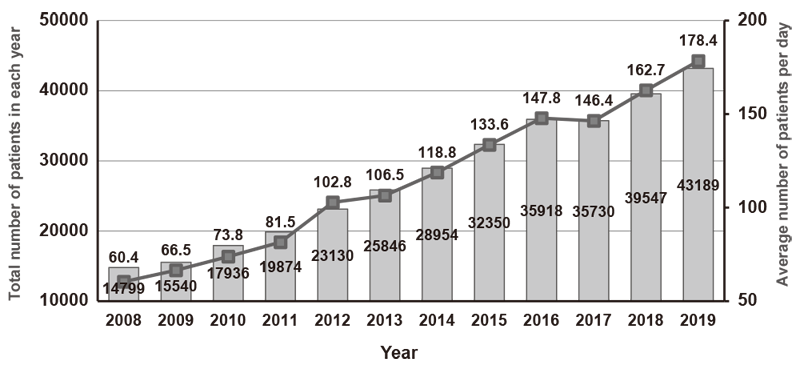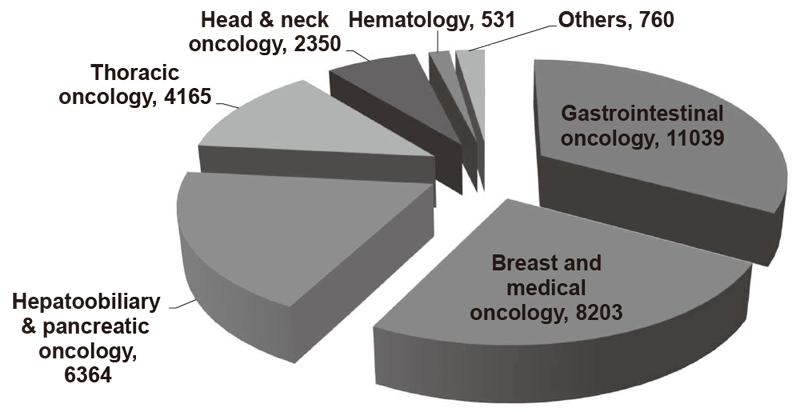Annual Report 2019
Outpatient Treatment Center
Masafumi Ikeda, Koichi Goto, Takayuki Yoshino, Mukohara Toru, Susumu Okano, Yosuke Minami, Kayoko Nakata, Naomi Ito, Noriaki Sato, Kenji Kawasumi, Yuko Ishikawa, Yoshiyuki Sano, Sachiko Doi, Miyuki Hara
Introduction
The Outpatient Treatment Center is responsible for anticancer treatment, such as chemotherapy, molecular targeted agents, and hormonal therapy for patients with all kinds of cancer. Our basic policy is to provide high-quality anticancer treatment and to support the lifestyle of patients and their families. Our goals are 1) To provide appropriate and satisfactory management of chemotherapy, and 2) To share the mindset of outpatients with our staff. We can provide high-quality and comfortable treatments with the collaboration of medical oncologists, nurses, pharmacists, laboratory technician, medical social workers, hospital clerks, and clinical research coordinators.
The Team and What We Do
Our team consists of one director, five medical oncologists, one nurse manager, two deputy nurses, 28 nurses, two chief pharmacists, two pharmacists, one resident of pharmacist, two assistants of nurses, and two reception staff. The Outpatient Treatment Center has a total of 73 beds including 5 beds for infusions or blood transfusions. In 2019, a total of 43,189 patients received anticancer treatment, and the average number of patients per day is 178.4 (Figure 1). As it was on an increasing trend year by year, the number of nurses was increased. The detailed numbers for each department are 11,039 in gastrointestinal oncology, 8,203 in breast and medical oncology, 6,304 in hepatobiliary and pancreatic oncology, 4,165 in thoracic oncology, 2,350 in head and neck oncology, 531 in hematology, and 760 in other departments (Figure 2). The monthly steering committee is held on the third Monday, 16:30-17:00, every month with the participation of medical oncologists, nurses, laboratory technicians, pharmacists, clinical research coordinators, and hospital clerks. We discuss the monthly activities and problems of this center raised from each section, such as nursing, pharmacy, and clinical trials, and plan the remedies for these problems.
Before new regimens and clinical trials are initiated in this center, staff meetings with medical oncologists, nurses, and pharmacists are held to safely and appropriately manage these treatments.
We have a telephone consultation service (hotline) for outpatients who have received anticancer treatments in this center. Pharmacists and nurses who are highly experienced in outpatient treatment respond with countermeasures for adverse events and answer any queries from patients or their families by telephone. If the consultations are serious, they transfer them to medical oncologists. This service was started in 2008 and gradually increased. In 2019, a total of 2,881 calls were received. The service contributes to prevent serious adverse events and relieve patients’ anxiety.


Research activities
In order to manage the beds efficiently, the nurse cooperated with blood sampling and the blood sampling frames for the early morning were expanded. This effort has been successful, and the activity of the beds was increased in the morning. After analyzing the orientation of the Outpatient Treatment Center, a new DVD was created and is currently in operation.
Education
We train up nurses and pharmacists with special knowledge who can enhance patients’ self-care skills and properly resolve some problems arising with the patients and their families during anticancer treatment.
Future prospects
We always manage the bed control efficiently at the Outpatient Treatment Center, and try to resolve the problem of waiting times for patients. We re-evaluated the contents of regimens that were only available on admission, such as introducing short hydration for regimens requiring a long time, and adjusted the regimens to be able to be received in the Outpatient Treatment Center. Thus, we are trying to actively accept additional patients who need to be treated with chemotherapy at outpatient clinics. Furthermore, a lot of new regimens and clinical trials are also being actively accepted.
